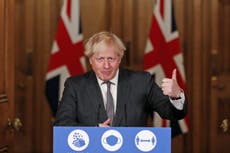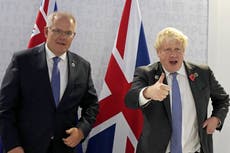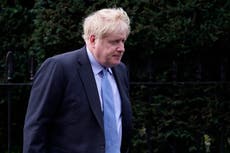How on earth did Brexit trade deal come to be signed by Boris on a bit of paper passed outside the loo?
The UK-Australia Free Trade Agreement wasn’t literally written on bog roll – but it may as well have been, so much did it damage British agriculture, writes Sean O’Grady


At the moment it feels rather like Boris Johnson is still running the country, such is his ubiquitous presence in the news. Always a “big personality”, almost everything he says and does attracts attention, often for all the wrong reasons, as we see with the neverending controversy about giving his WhatsApp messages and Covid pandemic diaries to the Hallett Inquiry.
He’s having yet another baby, which means we have to try and count them up all over again. He’s bought a mansion in Oxfordshire. And his shambolic ways in government keep coming back to haunt his successors, and indeed the rest of us.
Britain, in other words, has got a bad case of Long Johnson, with no cure in sight. Like randy little Dilyn mounting a guest’s leg during a party at Chequers, we just can’t seem to shake Johnson off.
Remarkably, we now learn that Johnson virtually signed away the British livestock industry during the course of a dinner with the then Australian prime minister, Scott Morrison in Downing Street. At the time, Brexit was new and fresh, and the Johnson government was desperate to show that Global Britain was going to be a success, going round the world in buccaneering spirit, striking lucrative new trade deals in far away dynamic economies to supersede the supposedly sclerotic EU Single Market.
So desperate was Johnson to sign one with the Australians that he first apologised to them for the UK joining the then European Economic Community in 1973 (which was nice but incessant), and felt so guilty about that historic betrayal that he blundered into crucial detailed concessions to them between the courses of home-reared beef and Scottish smoked salmon, washed down with copious fine Australian wines.
Unaccompanied by officials, and seemingly in relaxed and sentimental mood, Johnson casually agreed that the Australians could have their beef exported to the UK on the basis of the weight of the cuts of steak, rather than the weight of the carcass.
The well-sourced account of the trade disaster in Politico continues: “To their amazement, Johnson gave way on tariffs and product weights. Brandis, the high commissioner, moved like a flash, writing down Johnson’s pledge on a piece of paper and then excusing himself to go to the washroom. On his way to the toilet he handed the paper to an aide, the same former Australian official added.
“The aide digitally scanned the note and sent it instantly to the Australian High Commission on the Strand, where a waiting colleague quickly turned it into a formal trade document. This was sent back and — remarkably — printed out inside No 10, and then placed by the Australian team into an official-looking folder. The folder was handed back to Brandis as he headed back into the dinner.”
Johnson has called Politico’s account of what happened “rubbish”, but even if the UK-Australia Free Trade Agreement wasn’t literally written on bog roll, it may as well have been, so much did it damage British agriculture.
Johnson meekly signed up to the text, and the next day the Australians gleefully announced the agreement in principle. Liz Truss, reportedly “livid”, tried to stop it, but they threatened to denounce the deal to the excruciating embarrassment of the British. Some sort of untidy fudge was negotiated later, but the damage was done.
Like the latest deal with the Trans Pacific Partnership countries, and the separate deals with Japan, Kenya and others, the UK’s portfolio of trade deals add trivial amounts to British GDP, especially compared with the continuing damage wrought by the new trade barriers with the EU. And, of course, we all know who was crucial in securing the Leave vote in 2016.
It’s become a commonplace fact now that Johnson didn’t expect to win the 2016 Referendum, didn’t have a plan for after, had to have concepts such as a “customs union” and “free trade area” (and the differences between them) explained to him afterwards, and, according to Dominic Cummings, regrets Brexit ever happening at all.
The great irony is that he used the Brexit cause to usurp David Cameron and then Theresa May, and secured the best election result for the Tories in decades in 2019; but Brexit was also the instrument of destruction for the health of the economy, the security of the Union with Scotland and Northern Ireland, the unity of his party and the end of his own political career.
So discredited and unpopular has Brexit become, and so incompetent a leader has Johnson been revealed to be, that he cannot possibly contemplate making a political comeback now. He probably knows it. He’s a busted flush, you might add.
Some years hence, when Welsh, Scottish and English hill farmers face ruin as the baleful effects of the Australian trade deal come into maximum effect (and the similarly disadvantageous one with New Zealand), they will at least understand how their livelihoods were sacrificed to secure a symbolic but useless and illusory “Brexit bonus” for the jokers who were running this country at the time.
The Johnson administration, for all its electoral triumphs, historic moments and misfortunes of war and plague, did more damage to the country than any other in modern times. That’s something for Johnson to contemplate as he writes his memoirs in his comfortable country home.
Join our commenting forum
Join thought-provoking conversations, follow other Independent readers and see their replies
Comments


Bookmark popover
Removed from bookmarks